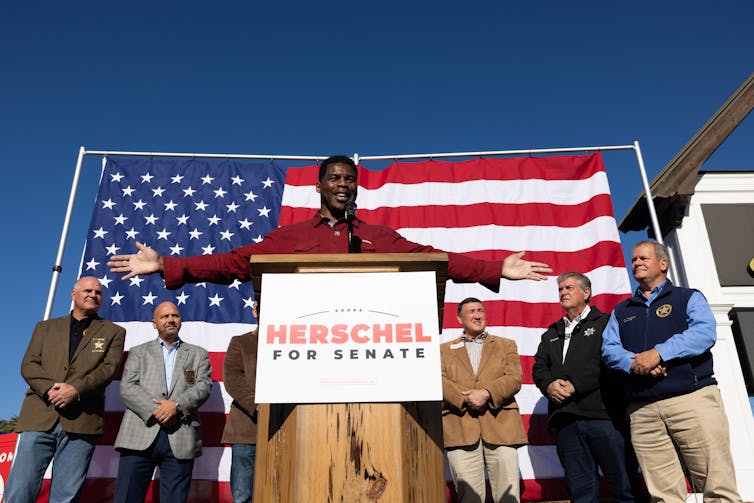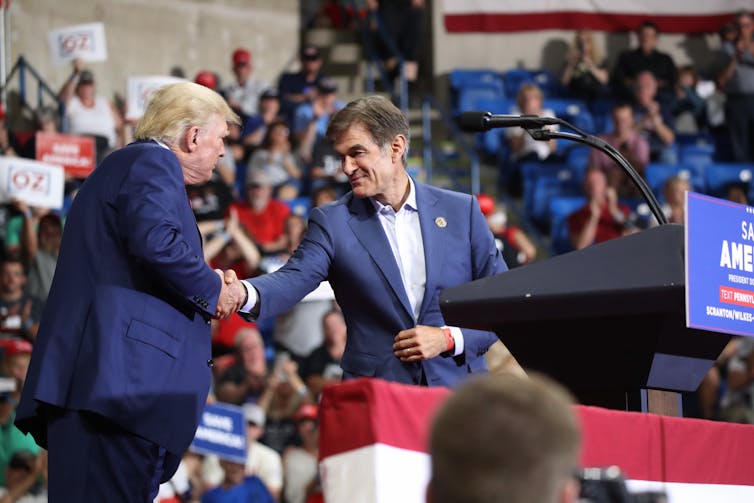After two former girlfriends accused Herschel Walker, the Georgia Republican Senate nominee and former football star, of pressuring them to get abortions, and giving them money for the procedures, Walker’s standing with conservative voters would have been expected to dip.
One reason is that Walker has taken an absolutist position on abortion – no abortions should be legal, even in the case of incest or rape or the health of the mother, he has said.
Instead, Walker has denied the allegations, and they appear to have boosted his odds of winning rather than diminished them. Why? Because he’s not a politician – he’s a celebrity.
We are sociocultural anthropologists who have studied white-collar crime and political corruption in the U.S. and Latin America. We can confidently say candidates like Walker, whose rule-breaking might have doomed a candidate in earlier times, benefit from a template developed by former President Donald Trump, who figured out how to turn celebrity status into political success.
This formula, which helped to transform Trump from a real estate mogul and celebrity TV character into the leader of the Republican Party, involves getting the public to register transgressive behavior as entertainment.
By adopting this template, several Trump-backed celebrity candidates have translated their personal fame into support from Trump’s base in the 2022 midterms.
A close look at Walker; Kari Lake, the GOP gubernatorial candidate in Arizona; and Mehmet Oz, the Republican senate candidate in Pennsylvania known as Dr. Oz, reflects how Trump has led politics down a path that not only prioritizes personality over policy, but also rewards celebrity politicians for behaving badly.

Trump’s celebrity candidates
Lake, a former news anchor for a local Fox TV station in Phoenix, was an Arizona celebrity when she announced her run for governor in June 2021.
Since then, Lake has engaged in political stunts, like falsely saying during a news conference that her rival, Katie Hobbs, broke into her campaign office dressed as a chicken.
Lake regularly berates journalists and has lied about Hobbs, falsely saying that she voted to block the Pledge of Allegiance being recited in schools. Lake believes the 2020 presidential election was stolen and has not said if she will accept the results of the 2022 midterms.
These antics are marked by celebrity rule-breaking and have mobilized Trump supporters.
Oz, meanwhile, established his fame as host of the Dr. Oz show, which reviewed medical and health products, especially diet-related products, and answered questions about health and wellness – on daytime programming. Now running to become a Pennsylvania senator, Oz has taken to mocking his opponent John Fetterman’s diet.
And during their live debate in October 2022, Oz questioned Fetterman’s recovery from a May 2022 stroke, asking whether he could understand and respond to what Oz was saying.
Walker has adopted his own Trump-style schtick by revealing an honorary sheriff’s badge to the audience during his only scheduled debate against Sen. Raphael Warnock. The move was intended to prove his pro-police bonafides. But the badge was not an actual police badge; it’s instead a token prop gifted to him by Georgia sheriffs.
Such performances by celebrity candidates don’t appear to diminish their reputations. In fact, they seem to attract voters who appreciate that these candidates don’t even try to act like conventional politicians.
Bad behavior before Trump
Celebrity politicians have always been held to a different standard than traditional politicians.
As media critic Neil Postman has noted, former U.S. president and Hollywood actor Ronald Reagan frequently said things that were untrue – and was not held accountable for doing so. Reagan praised the apartheid regime in South Africa for having ended segregation when it had not, and he repeatedly insisted that trees were harmful to the environment. Yet, he remained a popular political figure because most voters who backed him cared less about the veracity of what he said and more about his ability to tap into their emotions.
Sensing this, Reagan spent his time in the White House focusing on emotional impact rather than accuracy.
There are also examples of Democratic politicians behaving badly, and at odds with how they presented themselves as professionals. Jerry Springer was a Cincinnati councilman in the 1970s, before he resigned for paying prostitutes for sex. Springer went on to have a successful television career as a daytime talk show host. “Saturday Night Live” comedian Al Franken, who later became a Minnesota senator, resigned from his post in 2017 over sexual misconduct allegations. But in his case, Franken’s bad behavior pushed him out of politics, not further into it.
These kinds of political norms shifted with the rise of Trump’s political power, however, as Trump has relied less on his ability to inspire confidence than on his ability to amuse and entertain his fans.

The Trump shift
Throughout his political career, Trump has effectively used crude and derisive humor to elevate himself as an entertainer while transforming his opponents from sometimes stiff and humorless politicians into grotesque and laughable people. This humor would have been seen as rude and unpresidential if uttered by another person, or if said by Trump himself outside of the political arena.
Trump purposefully shames and embarrasses his political rivals, and his supporters celebrate these transgressions at his campaign rallies, which have become a collective space for his followers to revel in humiliating those he perceives to be his opponents.
At a 2016 rally, Trump mimicked firing a gun while critiquing a member of the U.S. Army who had been accused of desertion. In October 2022 at a rally, Trump threatened journalists with prison rape.
Such performances are effective not only because they inspire a call-and-response style of sycophantic celebrity fandom, but also because they resist the effect of criticism. No matter how harmful and demeaning Trump’s performances are to their targets, they can always be dismissed as comedic entertainment.
Walker, Lake and Oz are now also using their celebrity status to defy long-established rules of political engagement and to make morally questionable entertainment a viable political strategy.
These newly established rules indicate that Walker’s alleged hypocrisy will not be his political demise. The U.S. public is now conditioned to appreciate the antics of celebrities-turned-politicians and to believe that they should be held to different standards than everyone else.

